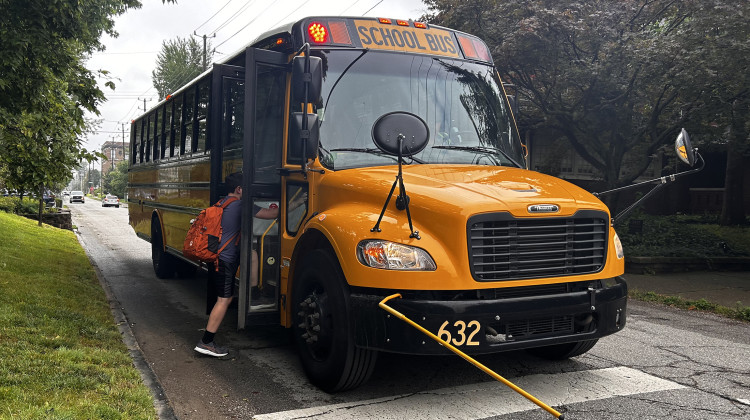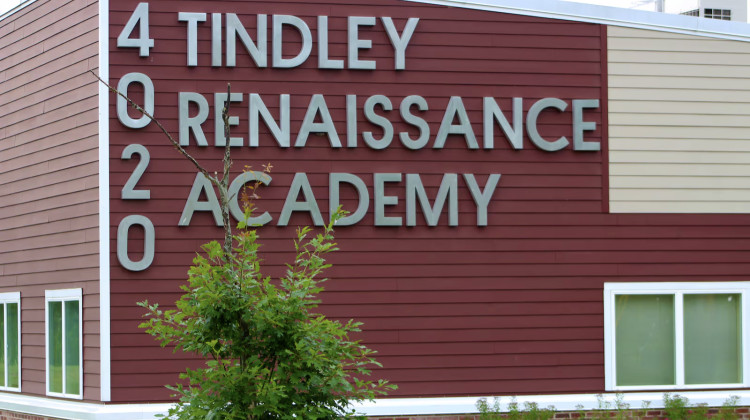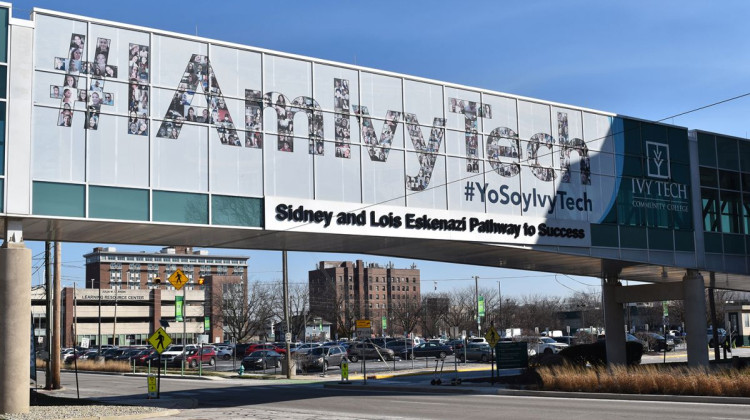
Keith Marsh, academic director at Indiana Agriculture and Technology School, explains aspects of the farm's hands-on learning plans.
Shaina Cavazos/ChalkbeatThe arrangement raised eyebrows from the start — an all-online school that also wanted to have a farm where students could learn.
Before Indiana Agriculture and Technology School opened in 2018, officials there found themselves answering questions about whether the land deal would benefit the school’s co-founder and how much time students would actually spend at the farm.
Now, the charter school is under scrutiny again after state education officials say students aren’t spending enough time learning in-person and many students live too far from the farm campus.
Indiana Agriculture and Technology School could lose its charter authorizer and potentially be forced to close unless it runs more like a brick-and-mortar school, a letter last week from the State Board of Education said. Its oversight agency, the Nineveh-Hensley-Jackson district, told Chalkbeat on Monday that officials are working on a plan to keep the school open. The district has until March 10 to formally respond to the state.
Indiana Agriculture and Technology School executive director and chief academic officer Keith Marsh did not return a call for comment.
A Chalkbeat investigation in 2018 raised concerns over whether Indiana Agriculture and Technology School should have been allowed to operate as a fully online school. State lawmakers didn’t want to let small districts like Nineveh-Hensley-Jackson oversee big virtual charter schools but left a loophole in state law that the agriculture school tried to use.
A small district has been blamed for the lax oversight of two troubled Indiana virtual charter schools that the state found inflated enrollment, taking $68 million in state money that they should have never received and funneling funding to a ring of private companies connected to school officials.
Under pressure from state education officials, Indiana Agriculture and Technology School backed down from its all-online model in the wake of the Chalkbeat investigation and conceded to run a blended school where less than half of instruction would happen online. The shift also allowed the agriculture school to receive the same per-pupil funding amount as brick-and-mortar schools, rather than the reduced amount for virtual schools.
But the school apparently didn’t really change, state education officials said.
When Indiana Agriculture and Technology School applied for a state charter school grant last fall, education officials took a closer look and found it was essentially operating as a virtual school. It described itself as a virtual school in its own handbook and defined attendance based on online participation, state officials said.
“Although IATS is currently asserting that slightly less than 50% of its education content is delivered via its virtual program, its self-published materials appear to contradict this contention,” the State Board of Education wrote last month, upholding its decision to deny the grant request.
Nineveh-Hensley-Jackson Superintendent Tim Edsell said he believes the agriculture school is conducting most of its learning in-person, based on meetings with school officials and the school calendar.
The school, which enrolls about 200 students in middle- and high-school grades, hosts “Active Participation Days” at two locations, a leased farm in Morgantown and St. Joseph’s College, a shuttered private college in Rensselaer.
The farm in Morgantown was originally purchased by the school’s co-founder to whom the school would pay rent. The co-founder has since stepped down from the board, though he still appears to be serving as treasurer. It’s not clear what the current lease agreement is.
A calendar shows the school hosts in-person lessons about once a week, occasionally twice a week, with a four-day “Farm Week” in May. Daylong lessons have included farm safety, agricultural machinery and drones, and syrup production and tree tapping. Tuesday’s lesson is tentatively scheduled to be “livestock newborn processing.”
Students have to find their own transportation to in-person lessons, which can present an access challenge. But the state also says Indiana Agriculture and Technology School is only supposed to enroll students from within the Nineveh-Hensley-Jackson district.
Students also must supplement their farm participation with 140 “educational experience hours” on their own each semester, according to a handout on the school’s website. That can include going to 4-H, Boy Scouts, or Girl Scouts meetings, attending farm shows, volunteering, or working at a job.
Last year, Indiana Agriculture and Technology School received about $800,000 in state funding. It’s unclear whether the state’s determination that it has been operating as an online school could affect its past or future funding.
“We are paying close attention to the corrective action they take and will continue to have discussions based on the school’s response,” Indiana Department of Education spokesman Adam Baker wrote in an email.
Chalkbeat is a nonprofit news site covering educational change in public schools.
 DONATE
DONATE







 Support WFYI. We can't do it without you.
Support WFYI. We can't do it without you.